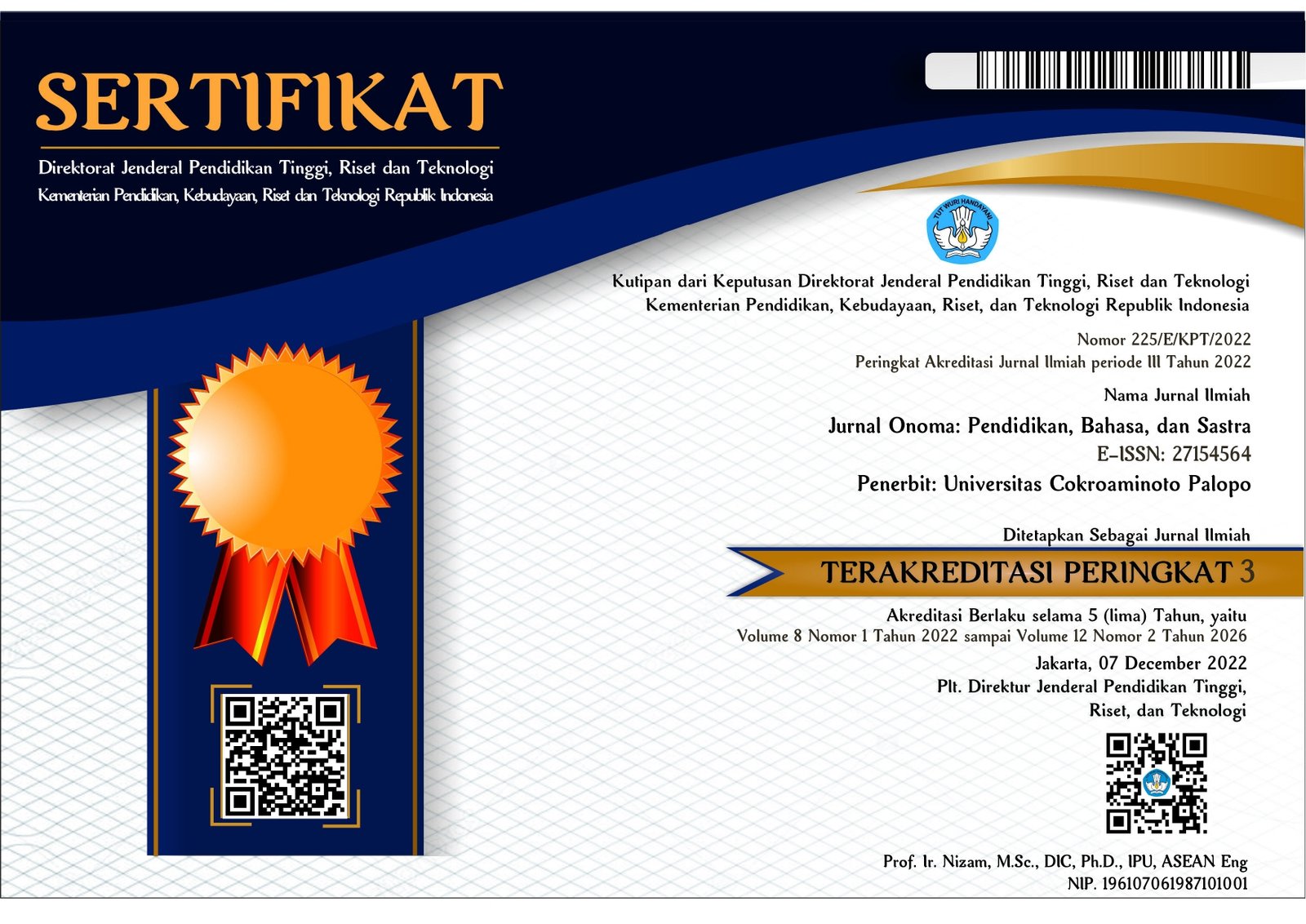Learning to Write Short Stories with the Assistance of Social Media as a Means of Improving Students Writing Skills in Indonesian Language Subjects Class XI SMA/SMK/MA
https://doi.org/10.30605/onoma.v11i1.4948
Keywords:
Writing lessons, short stories, social media, Telegram bots.Abstract
This research aims to enhance the short story writing skills of class XI SMA/SMK/MA students by utilizing the Telegram Bot as an innovative learning medium. Writing short stories is a fundamental skill in Indonesian language learning but often encounters challenges due to low student interest and limited innovation in instructional methods. This study employed a case study method with a qualitative approach to explore the application of Telegram Bots in improving students' writing skills. Data were collected through observation, interviews, and questionnaires, and analyzed to assess students' writing abilities, creative thinking, and engagement with social media. The findings indicate that the use of Telegram Bots significantly enhances students' proficiency in story structure and language use. Furthermore, social media has proven effective in motivating students by providing inspiration, fostering creative discussions, and facilitating constructive feedback. This research demonstrates that technology-based innovations, such as Telegram Bots, can create interactive, effective, and contextually relevant learning experiences tailored to the demands of the digital era.
Downloads
References
Arikunto, Suharsimi. (2016). Prosedur Penelitian Suatu Pendekatan Praktik. Jakarta: Rineka Cipta.
Daniel, Harapan, Parlindungan, Simanjuntak., Payerli, Pasaribu., Waston, Malau. (2019). The urgency of Academic Culture Development as Reinforcement of Character among Students. doi: 10.4108/EAI.24-10-2019.2290576. DOI: https://doi.org/10.4108/eai.24-10-2019.2290576
David, Schiefer. (2012). The Value of Cultural Values Reinvestigating the Relationship Between Culture-Level Values and Individual-Level Psychological Phenomena.
Elnaz, Nouri., Kallirroi, Georgila., David, Traum. (2017). Culture-specific models of negotiation for virtual characters: multi-attribute decision-making based on culture-specific values. Ai & Society, doi: 10.1007/S00146-014-0570-7. DOI: https://doi.org/10.1007/s00146-014-0570-7
Elvi, Yulianti. (2022). Local wisdom on a Short Story of Works by Students of Class XI SMA Negeri 19 Medan TP 2021/2022. International Journal of Humanities Education and Social Sciences, doi: 10.55227/ijhess.v1i4.126. DOI: https://doi.org/10.55227/ijhess.v1i4.126
Funmi, O., Bammeke. (2011). Education, Character and the Promotion of Cultural Values. Social Science Research Network,.
Giyatmi. (2020). Bringing Indonesian Local Wisdom Into the English Class. doi: 10.2991/ASSEHR.K.200804.009. DOI: https://doi.org/10.2991/assehr.k.200804.009
Heni, Dwi, Arista. (2020). Development of cultural literation in learning to build students’ character.
Heronimus, Delu, Pingge. (2017). 4. Kearifan lokal dan penerapannya di sekolah. doi: 10.53395/JES.V1I2.27. DOI: https://doi.org/10.53395/jes.v1i2.27
Ida, Komalasari., Ida, ., Rusdiana., Eva, Nor, Halisa. (2022). Kearifan Lokal dalam Kumpulan Puisi Banjar sebagai Media Pembelajaran pada Sekolah Menengah. Lentera: Jurnal Ilmiah Kependidikan, doi: 10.33654/iseta.v1i0.1846. DOI: https://doi.org/10.33654/iseta.v1i0.1846
Ilham, Nurrachman., Wikanengsih, Wikanengsih., Reka, Yuda, Mahardika. (2020). Analisis unsur intrinsik cerpen “dilarang menyanyi di kamar mandi” karya seno gumira ajidarma. doi: 10.22460/P.V3I6P859-870.5655.
Joko, Prayudha.S. (2023). Inserting Local Wisdom In English Material: Strategies and Benefits. Foremost Journal, doi: 10.33592/foremost.v4i2.3704. DOI: https://doi.org/10.33592/foremost.v4i2.3704
Jumriani, Jumriani., Mutiani, Mutiani., Muhammad, Adhitya, Hidayat, Putra., Syaharuddin, Syaharuddin., Ersis, Warmansyah, Abbas. (2021). The Urgency of Local Wisdom Content in Social Studies Learning: Literature Review. doi: 10.20527/IIS.V2I2.3076. DOI: https://doi.org/10.20527/iis.v2i2.3076
Muhammad, Rizal, Fauzi., Deri, Fadly, Pratama. (2020). Study of Local Wisdom Values in the Short Collection “Keajaiban Ceritaku” Stories of PGSD Students. doi: 10.2991/ASSEHR.K.201215.073. DOI: https://doi.org/10.2991/assehr.k.201215.073
Muhammad, Syauqi, Mubarok., Aan, Hasanah., Bambang, Samsul, Arifin. (2023). Core Ethical Values of Character Education Based on National Cultural Values in Madrasah. Edumaspul : jurnal pendidikan, doi: 10.33487/edumaspul.v7i2.6447. DOI: https://doi.org/10.33487/edumaspul.v7i2.6447
Nelson, Cowan. (2017). The many faces of working memory and short-term storage.. Psychonomic Bulletin & Review, doi: 10.3758/S13423-016-1191-6. DOI: https://doi.org/10.3758/s13423-016-1191-6
Novia, Putri, Ramadhani., Arini, Naila, Fahmi., Alfisyah, Nurhayati. (2024). Nilai kearifan lokal dalam tradisi kelahiran anak pada masyarakat adat tamansari wuluhan. Jurnal Ilmiah Ilmu Pengetahuan Sosial Indonesia, doi: 10.21154/jiipsi.v4i1.2846. DOI: https://doi.org/10.21154/jiipsi.v4i1.2846
Sugiyono. (2021). Metode Penelitian Pendidikan (Kuantitatif, Kualitatif, Kombinasi, R&D, dan Penelitian Pendidikan. Bandung : Alfabeta, CV.
Syahria, Anggita, Sakti., Suwardi, Endraswara., Arif, Rohman. (2024). Integrating Local Cultural Values into Early Childhood Education to Promote Character Building. International Journal of Learning, Teaching and Educational Research, doi: 10.26803/ijlter.23.7.5. DOI: https://doi.org/10.26803/ijlter.23.7.5
Taranjeet, Singh, Bhatia., Saad, Ahmad, Khan., Ladislau, Bölöni. (2014). The Education of a Crook: Reinforcement Learning in Social-Cultural Settings (Extended Abstract).
Usman, H. dkk. (2022). Metodologi Penelitian Sosial: Edisi Ketiga. Jakarta: Bumi Aksara.
Downloads
Published
How to Cite
License
In submitting the manuscript to the journal, the authors certify that:
- They are authorized by their co-authors to enter into these arrangements.
- The work described has not been formally published before, except in the form of an abstract or as part of a published lecture, review, thesis, or overlay journal.
- That it is not under consideration for publication elsewhere,
- That its publication has been approved by all the author(s) and by the responsible authorities – tacitly or explicitly – of the institutes where the work has been carried out.
- They secure the right to reproduce any material that has already been published or copyrighted elsewhere.
- They agree to the following license and copyright agreement.
License and Copyright Agreement
Authors who publish with Onoma Journal: Education, Languages??, and Literature agree to the following terms:
- Authors retain copyright and grant the journal right of first publication with the work simultaneously licensed under Creative Commons Attribution License (CC BY 4.0) that allows others to share the work with an acknowledgment of the work's authorship and initial publication in this journal.
- Authors are able to enter into separate, additional contractual arrangements for the non-exclusive distribution of the journal's published version of the work (e.g., post it to an institutional repository or publish it in a book), with an acknowledgment of its initial publication in this journal.
- Authors are permitted and encouraged to post their work online (e.g., in institutional repositories or on their website) prior to and during the submission process, as it can lead to productive exchanges, as well as earlier and greater citation of published work.

















